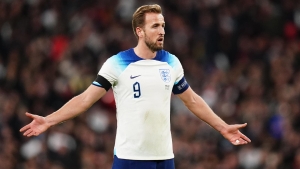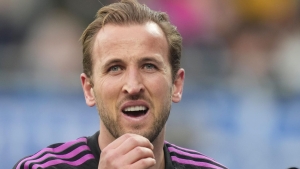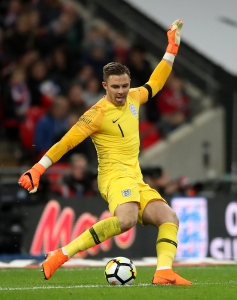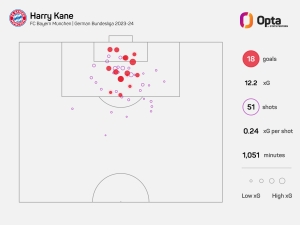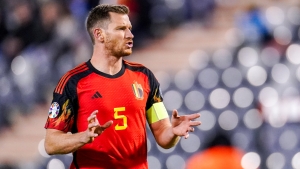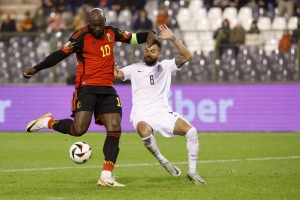With Saturday's Euro 2024 group-stage draw done and dusted, Europe's elite know what awaits them in Germany next year and all eyes will turn to the opening game in Munich on June 14.
Steve Clarke's Scotland will be Germany's first opponents as they kickstart their bid to become the first sole host nation to win the tournament since France in 1984.
Elsewhere, England can be content with a somewhat kind draw as Jude Bellingham, Harry Kane and company look to bring football home, while Group B looks set to earn the title of 'group of death', with defending champions Italy pitted against Spain and Croatia.
As fans across the continent begin plotting their nations' routes to the final, to be held in Berlin on July 14, Stats Perform runs through the best facts and figures from each of the six groups.
Group A: Germany, Hungary, Scotland, Switzerland
Germany have endured a troubled build-up to their home tournament, with Julian Nagelsmann parachuted in after the dismissal of Hansi Flick in September. The last Germany boss to win a major tournament at his first attempt was Jupp Derwall, who led the team (then West Germany) to Euro 1980 glory.
They will face a familiar foe in the form of Switzerland, who they will meet for the 54th time in senior internationals – no other team has faced Germany as often, but the teams have never met at the Euros before.
Germany's matchday one opponents will be Scotland, who will be making their fourth appearance at the Euros after also qualifying in 1992, 1996 and 2020. They have never reached the knockout stages.
However, they may fancy their chances of edging out Switzerland and Hungary in what could be a battle for second place this time around. Hungary took bronze when they first appeared at the Euros in 1964, but they have only won one of their nine games at the tournament since then (four draws, four defeats), beating Austria in the 2016 group stage.
Group B: Spain, Albania, Croatia, Italy)
All eyes will be on Group B ahead of the tournament, with three-time winners Spain drawn alongside defending champions Italy – who they beat in the 2012 final – and 2022 World Cup bronze medallists Croatia.
Excluding penalty shoot-outs, La Roja have only lost two of their last 22 matches at the Euros, winning 13 and drawing seven. The last two teams to beat them? Croatia and Italy in 2016.
Spain are the only nation to win back-to-back editions of the Euros, doing so in 2008 and 2012. Luciano Spalletti's Italy are looking to replicate that feat, having inched past Ukraine to claim second place in their qualification group.
The Azzurri have now qualified for eight successive editions of the tournament, though this is the first time they have reached a major competition while losing two or more games in their qualifying group, having been beaten home and away by England.
While Spain and Italy will feel unfortunate to have landed in such a difficult group, the omens are good for teams that face Croatia when it matters. They have lost to the eventual winners at four of their last six major tournaments, being beaten by Spain at Euro 2012, Portugal at Euro 2016, France at the 2018 World Cup, and Argentina in Qatar last year.
GROUP C: England, Denmark, Slovenia, Serbia
Gareth Southgate may be relieved to have avoided some of the heavy hitters with England landing in Group C, where they will start against Serbia on June 16 before taking on Denmark and Slovenia.
England's rematch with Denmark – who they beat in the Euro 2020 semi-finals – could be decisive in the battle for top spot. The Three Lions are unbeaten in all three of their meetings with Denmark at Euros/World Cups (two wins, one draw), with Switzerland the only team they have faced as often at tournaments without ever losing.
With Kane thriving at Bayern Munich and Bellingham a former star at Borussia Dortmund, two of the Three Lions' star players are no strangers to German turf.
They also have an excellent record against Slovenia, winning five and drawing one of the teams' six all-time meetings. The only one of those games to take place at a major tournament came at the 2010 World Cup, when Jermain Defoe hit the winner in a 1-0 victory for Fabio Capello's team.
Serbia, meanwhile, will be featuring at the Euros for the first time as an independent nation. They competed as Yugoslavia or FR Yugoslavia in five editions, finishing as runners-up in 1960 and 1968.
Group D: France, Austria, Netherlands, play-off winner A
With Kylian Mbappe spearheading their star-studded team, France head to the Euros among the favourites. Boss Didier Deschamps captained his country to glory at Euro 2000, and he could become the first person to win the competition as both a player and a head coach.
Les Bleus, however, face a tough set of opponents in Group D, none more so than the Netherlands.
France have faced the Oranje more often at the Euros without ever winning than they have any other side, losing their last two such matches against them at the 2000 and 2008 tournaments.
Ronald Koeman might be pleased to see his team drawn alongside Austria, with the Netherlands winning their last seven matches against them, averaging 2.9 goals per game throughout that run (20 in total).
The final team in Group D will be decided via the play-offs in March, with Wales, Finland, Poland and Estonia vying for a ticket to Germany. France have met any of those nations at the Euros.
Group E: Belgium, Romania, Slovakia, play-off winner B
Belgium headline Group E, with Domenico Tedesco at the wheel as the last members of the Red Devils' so-called golden generation look to finally deliver on their promise.
Since losing to West Germany in the final of Euro 1980, Belgium have never reached the semi-finals of the tournament, being knocked out in the last eight at each of the last two editions – versus Wales in 2016 and Italy at Euro 2020.
They will be content with a kind-looking draw, with Romania the team drawn into Group E from pot two. Their win ratio of just six per cent at the Euros is the worst of any nation to qualify for more than one edition, winning just once in 16 games at the tournament.
Slovakia, meanwhile, have only won two of their seven games at Euro tournaments (one draw, four defeats), also failing to score in four of their last five games.
Ukraine, Israel, Bosnia and Herzegovina and Iceland will battle for the final spot in this group in March.
GROUP F: Portugal, Turkiye, Czech Republic, play-off winner C
Group F contains 2016 winners Portugal, the only team to reach the knockout stages of the last seven editions of the Euros, a run that stretches back to the 1996 tournament. In fact, they have always progressed from the group stages in their eight previous appearances at the Euros.
Cristiano Ronaldo seems set to be sticking around for this tournament. He will be 39 by the time it rolls around. The Al Nassr attacker holds the records for most games (25) and most goals (14) at the Euros, has also managed a joint-record six assists (since records began in 1972).
Ronaldo's 20 total goal involvements at the Euros are twice as many as any other player since assist records began, with Michel Platini second on 10 (nine goals, one assist).
Roberto Martinez's team open their campaign against the Czech Republic, who are featuring at an eighth successive edition of the Euros (including appearances as Czechoslovakia). Only Germany (14) and France (nine) are currently on longer runs of consecutive appearances.
One of Georgia, Greece, Kazakhstan and Luxembourg will join Turkiye in rounding out the group. They are looking to improve on their dismal showing at Euro 2020, and have qualified for three successive editions of the Euros for the first time. However, they have lost six of their last seven matches at the tournament (one win).

























